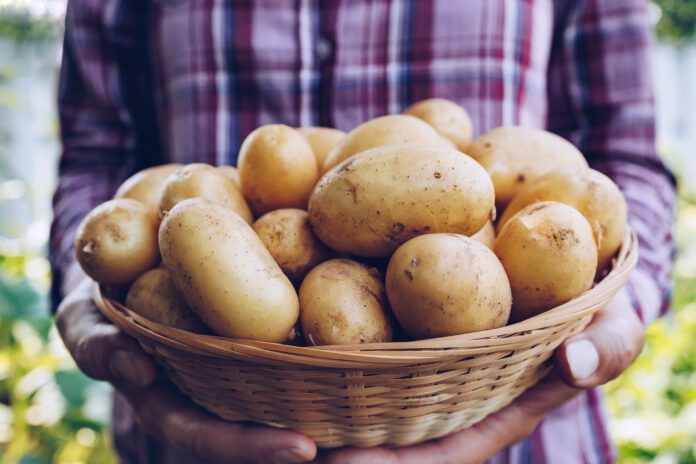Potato cultivation plays a vital role in meeting the dietary needs of people in Odisha, India, and the world. It serves as a versatile ingredient for a wide range of dishes, from traditional curries to popular snacks. However, there exists a significant gap between the demand and supply of potatoes in the state.
This necessitates the adoption of innovative farming techniques and emphasizes value addition, processing, storage, and marketing, particularly for small and marginal farmers and their associations. This presents an opportunity and a requirement to ensure that primary cultivators receive fair market prices to sustain their livelihoods. Presently, Odisha produces only 20% of its potato requirement, with the remaining 80% sourced from other states like West Bengal and Bihar.
Table of Contents
Addressing the Global Demand for Potatoes
The demand for potatoes extends beyond Odisha’s borders. It is not only an important food crop in India but also a staple in many parts of the world. With a growing global population and increasing consumption, the demand for potatoes continues to rise. To meet this demand, innovative farming practices are crucial, both at the regional and global levels.
The Need for Innovative Farming Practices

Innovation is the key to bridging the gap between potato demand and supply. Embracing cutting-edge farming techniques, improving seed quality, and enhancing yields are essential to fulfill the increasing need for this versatile crop. India and other potato-producing nations must collaborate to drive innovation in potato farming.
Enhancing Potato Quality and Yield
Meeting the global demand for potatoes requires not only quantity but also quality. Research and development are essential to create superior potato varieties that are disease-resistant and high-yielding. These efforts contribute to global food security and the promotion of high-quality produce.
The Role of Value Addition and Technology
To support small and marginal farmers and make potato farming more attractive, value addition and technology adoption are critical. Investment in cold storage, efficient marketing, and value-added processing can create new opportunities for farmers and promote sustainability in the potato industry.
Challenges Faced by Small and Marginal Farmers
Small and marginal farmers are the backbone of potato farming, not only in Odisha but also in India and beyond. Addressing the challenges they encounter, such as access to quality seeds, affordable technology, and marketing opportunities, is vital for the sustainable growth of the potato sector. Empowering these farmers is a shared responsibility for all potato-producing regions.
Transforming Agriculture for a Sustainable Future
Potato farming’s significance transcends regional boundaries, making it a global concern. India and other potato-producing nations should take proactive steps to transform subsistence agriculture into a diversified, technology-driven business. This transformation can improve the livelihoods of small farmers and attract the younger generation to pursue agriculture as a lucrative profession.
Promoting Mechanization and Modernization
Mechanization is essential to address labor shortages and enhance efficiency. Modern farming practices, including the use of machinery like planters and diggers, can reduce costs and improve productivity. It is high time for India and other potato-producing countries to promote mechanization in potato farming.
Government Initiatives and Support
Government support and subsidies play a pivotal role in fostering the growth of potato farming. Initiatives such as providing subsidies for setting up cold storage facilities and announcing support prices can shield farmers from market fluctuations and ensure a stable income.
Self-Sufficiency in Potato Production
Self-sufficiency in potato production is a goal worth pursuing for India and other potato-producing nations. Achieving this requires promoting the local production of high-quality seeds to encourage farmers to expand potato cultivation and contribute to global food security.
Apical Rooted Cutting (ARC) for Improved Seed Quality
Innovative technologies like “apical rooted cutting (ARC)” have the potential to enhance seed quality while reducing costs. These cost-effective methods allow small farmers to produce their potato seeds, creating affordable and high-quality options for both local and global potato production.
Sustainable Water Use
Sustainable water management is essential for the future of potato farming in India and around the world. To avoid environmental degradation and groundwater depletion, adopting prudent water-use practices is critical. This can serve as a valuable lesson for sustainable agriculture worldwide.
Global Lessons and Sustainable Agriculture
India’s experiences and practices in potato farming can offer valuable lessons for sustainable agriculture globally. By sharing knowledge and collaborating with other potato-producing nations, India can contribute to a more sustainable and food-secure world.
Conclusion
Potato farming’s significance transcends borders, making it a global concern. India and other potato-producing countries must embrace innovation, modernization, and sustainability to meet the rising global demand for this versatile crop. By working together and sharing experiences, the world can secure a future with abundant and high-quality potatoes while offering an attractive career option for the younger generation in agriculture.
Also read: Food Security And Entitlements: Challenges and Solutions


